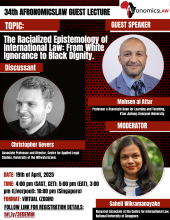Book Review Symposium II: The African Continental Free Trade Area Agreement: Legal and Policy Frameworks (Routledge, 2024)
Ajibo’s The African Continental Free Trade Area Agreement: Legal and Policy Frameworks offers a comprehensive analysis of the African Continental Free Trade Area (AfCFTA) Agreement, its challenges, prospects, and recommendations for future directions. The book equally explores the AfCFTA Agreement’s expected impact on economic growth, regional integration, and legal harmonisation, together with its Protocols, thereby serving as the go-to text for students, researchers, and legal practitioners interested in the ambitious goals of the AfCFTA Agreement. Although other textbooks have been written about the AfCFTA, Ajibo painstakingly adds some twists to this text as he examines the AfCFTA Agreement together with its protocols, such as the Protocols on Trade in Services, Trade in Goods, Investment, Intellectual Property, Rules on Dispute Settlement, and Competition Policy.
